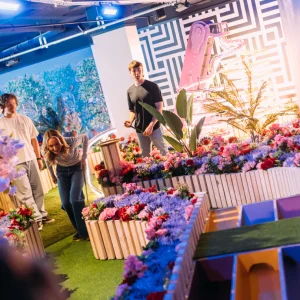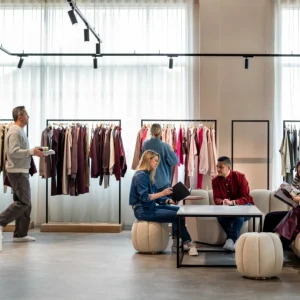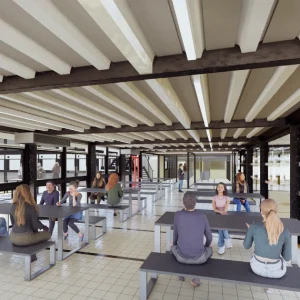The six prefab houses are built on the Thai-Burmese border in the Karen refugee villages. In 2008, the TYIN team went to work in the small village of Noh Bo where a fellow Norwegian, Ole Jørgen Edna, founded the Safe Haven Orphanage for Karen children in 2006. Their brief was to construct new dormitories to house 25 more children, using local materials and avoiding the use of tropical hardwoods.
According to TYIN, the main driving force behind the project was to recreate what these children would have experienced in a more normal situation – a private living space, a home to live in and a neighbourhood where they could interact and play. TYIN designed six sleeping units with the purpose of replicating village life for displaced children.
The buildings were named ‘Soe Ker Tie Hias’, which means ‘the Butterfly Houses’, because of their appearance. The bamboo weaving technique used on the side and back facades is commonly found in local houses and crafts. Most of the bamboo is harvested within a few kilometres of the site. The special roof shape of the Soe Ker Tie Houses enables effective natural ventilation and collects rainwater as well. This makes the areas around the buildings more useful during the rainy season, by providing the possibility of collecting the water to be used in drier periods.
The homes are prefabricated and assembled on site, adding to their sustainable appeal. The houses are raised off the ground, set on four foundations cast in old tires, eliminating the problem of excessive moisture and resulting rot.
The Butterfly Houses project was completed in February 2009 and accommodates 50 local children.
Other five finalists for the Earth Awards are: Kayu Sunglasses by Jamie Lim, Kayu, US; AskNature by Sherry Ritter, The Biomimicry Institute, US; Artificial Photosynthetic Foam by David Wendell, University of Cincinnati, US; Polli-Bricks by Taiwan-based MiniWIZ Sustainable Energy Development Ltd.; and Sustainable Shells by South Africa-based Peter Rich Architects with a team from University of Cambridge led by Michael Ramage.
All the finalists will pitch to top CEOs at an Innovators Summit in London, to secure funding to bring their concepts to market and highlight the influence of construction in driving positive change. Each category winner will receive $10,000 and the grand prize winner will receive $50,000. Winner will be announced at a gala dinner at Bridgewater House in London on 16 September 2010.
Founded in 2008, Earth Awards is a global search for sustainable inventions backed by Richard Branson and the US Green Building Council’s Rick Fedrizzi. It celebrates designers from the worlds of architecture, innovation, product design, process efficiency, fashion, and social justice and gives shape to their vision.





